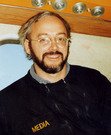Scott Nicholson's Blog, page 29
January 18, 2011
Book piracy. Who cares?
There's a little debate going around in which writers are calculating the millions of dollars they've lost, as well as that wonderful, lofty perch on the bestseller list, because of all those meany pirates out there dumping their book files into torrents. I tweeted last week that 10,000 illegal downloads doesn't mean 10,000 lost sales, it means maybe five lost sales. And I'll bet it was because the book was overpriced to begin with. (Which almost universally means either someone else is setting your price who has their own agenda instead of the writer's best performance and income in mind, or else you have not paid one bit of attention to the digital market in the past two years. Or, in the case of New York publishing, both).
My books have been stolen for years. Ironically, it's only my corporate books that are illegally shared; my DRM-free ebooks don't show up there, yet they could easily be shared, swapped, ripped, and even rewritten. I only even notice the piracy when I do Google alerts of my name and see them in the rapidshare and torrent streams. I don't even know what those streams do, or how they work, and I don't care. It would be like sticking my thumb in a river to try to plug a dam six miles downstream. It would be a full-time job and all I would get is a wet finger. And the pirates would never even notice.
Why do I not care? It's stealing, and stealing is wrong. Anybody who says it's not stealing is wrong. I don't even make cassettes or copies of my own CDs, not even for personal use. But I am not casting stones, because I've conducted other illegal or immoral acts. None of us are without sin.
But I'm a writer, not the world's morality cop. And I have plenty of my own shortcomings. Anyway, the author has many antidotes to piracy:
1. Quit freaking out--stealing or not, this is how people communicate in the modern age. They share. They mutually create content and their shared experiences. They aren't as hung up on "ownership."
2. Take control of your content (from a corporation) and make it cheap. If your book is a buck or two, all but the most ardent thieves (who are spending their time stealing instead of reading anyway) would rather just buy the book and save the hassle. And you'll make the same amount of money, anyway. Actually, far more.
3. Find your own translators. Even if you gave up control of your English rights to a corporation, you can still seek translators on your own. If somebody cracks your book, translates it, and puts it out, that's an incredible homage--many hours of their life. This way, you can make a little money and pay them a royalty.
4. Use it as a positive. In five years, you'll be "selling" your download stats to sponsors and advertisers. And getting ripped off big-time then becomes an asset. Think of them as your future shares in the new market.
5. Why do we write in the first place? If you had told someone 100 years ago you could widely spread your ideas to millions of people at no cost, they would have said you've gone to writer heaven. Or you've gone insane. Which, when you look at it, is basically the same thing.
###
My books have been stolen for years. Ironically, it's only my corporate books that are illegally shared; my DRM-free ebooks don't show up there, yet they could easily be shared, swapped, ripped, and even rewritten. I only even notice the piracy when I do Google alerts of my name and see them in the rapidshare and torrent streams. I don't even know what those streams do, or how they work, and I don't care. It would be like sticking my thumb in a river to try to plug a dam six miles downstream. It would be a full-time job and all I would get is a wet finger. And the pirates would never even notice.
Why do I not care? It's stealing, and stealing is wrong. Anybody who says it's not stealing is wrong. I don't even make cassettes or copies of my own CDs, not even for personal use. But I am not casting stones, because I've conducted other illegal or immoral acts. None of us are without sin.
But I'm a writer, not the world's morality cop. And I have plenty of my own shortcomings. Anyway, the author has many antidotes to piracy:
1. Quit freaking out--stealing or not, this is how people communicate in the modern age. They share. They mutually create content and their shared experiences. They aren't as hung up on "ownership."
2. Take control of your content (from a corporation) and make it cheap. If your book is a buck or two, all but the most ardent thieves (who are spending their time stealing instead of reading anyway) would rather just buy the book and save the hassle. And you'll make the same amount of money, anyway. Actually, far more.
3. Find your own translators. Even if you gave up control of your English rights to a corporation, you can still seek translators on your own. If somebody cracks your book, translates it, and puts it out, that's an incredible homage--many hours of their life. This way, you can make a little money and pay them a royalty.
4. Use it as a positive. In five years, you'll be "selling" your download stats to sponsors and advertisers. And getting ripped off big-time then becomes an asset. Think of them as your future shares in the new market.
5. Why do we write in the first place? If you had told someone 100 years ago you could widely spread your ideas to millions of people at no cost, they would have said you've gone to writer heaven. Or you've gone insane. Which, when you look at it, is basically the same thing.
###
Published on January 18, 2011 07:46
January 15, 2011
Archer McFall--the sequel
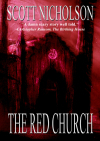 Since The Red Church is a perennial favorite and Drummer Boy is gaining ground, I have been exploring the idea of writing the third book in the "Littlefield series." While many of my earlier novels referencce other fictional locations in Windhsake, Pickett County, and Whispering Pines, as well as Black Rock, these two books both have Sheriff Littlefield as a prominent character (though they are separate sets of events, Littlefield has a few "WTF" moments because he knows more than anyone).
Since The Red Church is a perennial favorite and Drummer Boy is gaining ground, I have been exploring the idea of writing the third book in the "Littlefield series." While many of my earlier novels referencce other fictional locations in Windhsake, Pickett County, and Whispering Pines, as well as Black Rock, these two books both have Sheriff Littlefield as a prominent character (though they are separate sets of events, Littlefield has a few "WTF" moments because he knows more than anyone).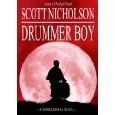 My idea at this point its to bring Ronnie Day from The Red Church and Bobby Eldreth from Drummer Back back, and this time they are in high school. An older, more dissipated and perhaps bitter Sheriff Frank Littlefield (think: if Clint Eastwood did for Dirty Harry what he did to his western persona in Unforgiven) and that's where I headed. And, of course, Archer McFall is now back in town. Maybe in the same form, maybe not.
My idea at this point its to bring Ronnie Day from The Red Church and Bobby Eldreth from Drummer Back back, and this time they are in high school. An older, more dissipated and perhaps bitter Sheriff Frank Littlefield (think: if Clint Eastwood did for Dirty Harry what he did to his western persona in Unforgiven) and that's where I headed. And, of course, Archer McFall is now back in town. Maybe in the same form, maybe not.Do you have any ideas along those lines? (Note: ideas are not copyrightable, so don't accuse me of "stealing your idea" later. If you love your idea so much, you should write a book yourself. If you just want to have some input, then put it here--because I want to write the books you want to read.) Just guessing, I'd say the cover is likely to be red... Thanks.
###
Published on January 15, 2011 11:48
January 11, 2011
new mystery release--CRIME BEAT
Hey, sign up for my free newsletter and be entered to win a limited-edition hardcover of Transparent Lovers, from PS Publishing. Also giving away used hardcover of Max Brooks' World War Z and three sealed copies of Black Static magazine. Drawing Thursday to commemorate launch of my new mystery novella Crime Beat.
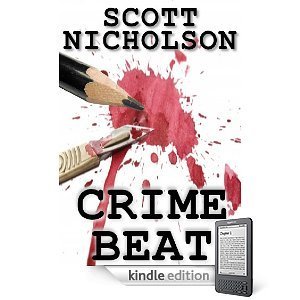
Crime doesn't pay...but neither does journalism. When John Moretz takes a reporter job at a small Appalachian newspaper, a crime spree erupts that quickly escalates to serial killing. And Moretz seems to know just a little bit more than he's putting on the front page.
99 cents for a limited time at Amazon or Amazon UK
Or at Amazon UK
For Nook at BN.com
In all formats at Smashwords
Thanks for helping spread the word.
###

Crime doesn't pay...but neither does journalism. When John Moretz takes a reporter job at a small Appalachian newspaper, a crime spree erupts that quickly escalates to serial killing. And Moretz seems to know just a little bit more than he's putting on the front page.
99 cents for a limited time at Amazon or Amazon UK
Or at Amazon UK
For Nook at BN.com
In all formats at Smashwords
Thanks for helping spread the word.
###
Published on January 11, 2011 14:05
January 8, 2011
Why Did I Read That? By Guido Henkel
(Today's guest post is by Guido Henkel, author of the Jason Dark series. See the first, Demon's Night, in multiple formats at Smashwords)
 As I finished reading Moses Siregar's "The Black God's War" and began looking for a new book to read next, for some reason, I asked myself the question, what is it that makes me like and favor certain authors?
As I finished reading Moses Siregar's "The Black God's War" and began looking for a new book to read next, for some reason, I asked myself the question, what is it that makes me like and favor certain authors?
The entire world fawns over Stephen King, for example, and each of his books turns automatically into a bestseller. While I don't dislike King, I do not consider myself a fan of his, either. To me, he wrote good books and bad books, and among them, a handful of true gems. Too often, however, I feel as if he's getting lost in his own stories. I once said that if a director needs 3 hours to tell a story, then he's doing something wrong — my case in point at the time was James Cameron's "Titanic." I still stand by that sentiment with maybe one or two exceptions, such as "The Lord of the Rings" movies and stories that contain so many side plots that it would actually harm the film if it were cut down for length. There is certain epic material that commands more length, clearly, but the story of an Atlantic crossing and the included sinking of a passenger ship is not one of them.
To me, the same is true for books. If an author needs over 1000 pages to tell a story that others manage to tell in 700 pages, I am getting dubious. Despite his commercial success and critical acclaim, to me King makes the same mistake over and over again — he strays. I recently read a book called "The Swarm," which made the same mistake. Thunderously thick, the book takes almost a third of its length just to set up the story's actual premise. That ain't right… Don't waste my time. It is every bit as precious as yours.
So, what is it then that I do like about certain authors? To me, it is usually a case of intrigue. I don't care much for literary gimmicks. If an author feels he has to prove to me that he can find the most exotic words in his Thesaurus, he makes a huge mistake. Not only does he take me out of the experience of the story because the word sticks out like a sore thumb, he also belittles his readers who might not be familiar with the word. I am not advocating dumbed-down writing, but I think there is a fine line somewhere along which an author can still show his prowess and connect with his readers without talking down to them.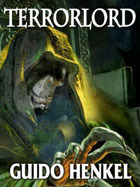 Sure, there is a market for so-called literary books, but when it comes to commercial, mainstream writing, I think finding the right tone is crucial.
Sure, there is a market for so-called literary books, but when it comes to commercial, mainstream writing, I think finding the right tone is crucial.
The same goes for metaphors. Metaphors are great when they work, but some writers have a tendency to force them, pulling noticeably at straws, just to come up with something that might seem imaginative. To me, that is bad style, plain and simple, regardless of genre, on par with convoluted sentences that make you reread them three times to figure out their meaning. Why would someone write like that?
To me, good writing is like good verbal storytelling. I have never met a really good storyteller who speaks in super-injected sentences that make you ask him to repeat them, just so you can fathom out what it was he was trying to say. No, a good storyteller makes sure the meaning gets to you before he even says it. A good storyteller hooks you and takes you onto a journey. Imagine, someone told you a story that would suddenly take you down paths that are entirely irrelevant to the story, unraveling infinite details and story facets that lie a hundred years before the actual events, including people who have been dead three generations before the story actually took place and have nothing whatsoever to contribute to the plot… If you're anything like me, you would simply tune out.
But books are different than verbally told stories, many people will say. Well, that is certainly a point that is up for discussion, and it is one point I honestly beg to differ. Are they really different, or is this just something the book critics want us to believe? That good books must have superior literary aspects? Should I really feel bad that I actually enjoy reading Clive Cussler's adventures, easy-on-the-reader as they may be?
You may disagree, but in my opinion, good books are every bit like stories that are being told. They are to the point. They stay on topic. They hook the reader and pull him along. Most importantly, though, to me, a good book is written in the language of its readers. It makes you forget that thousands of others may read the same story. A good book makes you feel that it was written specifically for you!
There are masters out there who do an amazing job at this. When I first read Mark Frost's "The List of Seven," the book instantly became my all-time favorite. Not because it had frilly language, not because Frost tried to impress the world with his vocabulary. All that is there in the book, but the way he put it all together made you forget everything around it. The story and the language were one, he made masterful use of the most powerful tool any writer can wield. He used magic! The magic to make me forget I was reading a story, the magic to conjure up images in my mind and dazzle me with deviously schemed plots. So much so that when the book was over, I sat breathlessly and asked myself, "Oh my god, what am I going to read now, because everything else will feel bland from here?"
To this day, about 20 years and uncounted books-read later, "The List of Seven" is still the epitome of a great book to me. Untouched, religiously revisited every other year or so, it is the book I wish I would have written.
###
 As I finished reading Moses Siregar's "The Black God's War" and began looking for a new book to read next, for some reason, I asked myself the question, what is it that makes me like and favor certain authors?
As I finished reading Moses Siregar's "The Black God's War" and began looking for a new book to read next, for some reason, I asked myself the question, what is it that makes me like and favor certain authors? The entire world fawns over Stephen King, for example, and each of his books turns automatically into a bestseller. While I don't dislike King, I do not consider myself a fan of his, either. To me, he wrote good books and bad books, and among them, a handful of true gems. Too often, however, I feel as if he's getting lost in his own stories. I once said that if a director needs 3 hours to tell a story, then he's doing something wrong — my case in point at the time was James Cameron's "Titanic." I still stand by that sentiment with maybe one or two exceptions, such as "The Lord of the Rings" movies and stories that contain so many side plots that it would actually harm the film if it were cut down for length. There is certain epic material that commands more length, clearly, but the story of an Atlantic crossing and the included sinking of a passenger ship is not one of them.
To me, the same is true for books. If an author needs over 1000 pages to tell a story that others manage to tell in 700 pages, I am getting dubious. Despite his commercial success and critical acclaim, to me King makes the same mistake over and over again — he strays. I recently read a book called "The Swarm," which made the same mistake. Thunderously thick, the book takes almost a third of its length just to set up the story's actual premise. That ain't right… Don't waste my time. It is every bit as precious as yours.
So, what is it then that I do like about certain authors? To me, it is usually a case of intrigue. I don't care much for literary gimmicks. If an author feels he has to prove to me that he can find the most exotic words in his Thesaurus, he makes a huge mistake. Not only does he take me out of the experience of the story because the word sticks out like a sore thumb, he also belittles his readers who might not be familiar with the word. I am not advocating dumbed-down writing, but I think there is a fine line somewhere along which an author can still show his prowess and connect with his readers without talking down to them.
 Sure, there is a market for so-called literary books, but when it comes to commercial, mainstream writing, I think finding the right tone is crucial.
Sure, there is a market for so-called literary books, but when it comes to commercial, mainstream writing, I think finding the right tone is crucial.The same goes for metaphors. Metaphors are great when they work, but some writers have a tendency to force them, pulling noticeably at straws, just to come up with something that might seem imaginative. To me, that is bad style, plain and simple, regardless of genre, on par with convoluted sentences that make you reread them three times to figure out their meaning. Why would someone write like that?
To me, good writing is like good verbal storytelling. I have never met a really good storyteller who speaks in super-injected sentences that make you ask him to repeat them, just so you can fathom out what it was he was trying to say. No, a good storyteller makes sure the meaning gets to you before he even says it. A good storyteller hooks you and takes you onto a journey. Imagine, someone told you a story that would suddenly take you down paths that are entirely irrelevant to the story, unraveling infinite details and story facets that lie a hundred years before the actual events, including people who have been dead three generations before the story actually took place and have nothing whatsoever to contribute to the plot… If you're anything like me, you would simply tune out.
But books are different than verbally told stories, many people will say. Well, that is certainly a point that is up for discussion, and it is one point I honestly beg to differ. Are they really different, or is this just something the book critics want us to believe? That good books must have superior literary aspects? Should I really feel bad that I actually enjoy reading Clive Cussler's adventures, easy-on-the-reader as they may be?
You may disagree, but in my opinion, good books are every bit like stories that are being told. They are to the point. They stay on topic. They hook the reader and pull him along. Most importantly, though, to me, a good book is written in the language of its readers. It makes you forget that thousands of others may read the same story. A good book makes you feel that it was written specifically for you!
There are masters out there who do an amazing job at this. When I first read Mark Frost's "The List of Seven," the book instantly became my all-time favorite. Not because it had frilly language, not because Frost tried to impress the world with his vocabulary. All that is there in the book, but the way he put it all together made you forget everything around it. The story and the language were one, he made masterful use of the most powerful tool any writer can wield. He used magic! The magic to make me forget I was reading a story, the magic to conjure up images in my mind and dazzle me with deviously schemed plots. So much so that when the book was over, I sat breathlessly and asked myself, "Oh my god, what am I going to read now, because everything else will feel bland from here?"
To this day, about 20 years and uncounted books-read later, "The List of Seven" is still the epitome of a great book to me. Untouched, religiously revisited every other year or so, it is the book I wish I would have written.
###
Published on January 08, 2011 10:51
January 3, 2011
The Pumpkin Patch
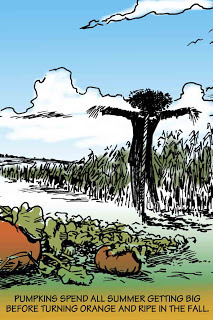 We had so much fun putting together If I Were Your Monster for Kindle and Nook and paper (its page is now up at my site) that Sergio Castro and I are working on a version of The Pumpkin Patch, adapted from our little-read comic Little Shivers (Only 20 copies were printed, so if you happen to have one, seal it in plastic and put your kid through college).
We had so much fun putting together If I Were Your Monster for Kindle and Nook and paper (its page is now up at my site) that Sergio Castro and I are working on a version of The Pumpkin Patch, adapted from our little-read comic Little Shivers (Only 20 copies were printed, so if you happen to have one, seal it in plastic and put your kid through college).Sergio did brilliant work on both Grave Conditions and the Dreamboat project that is still being shopped. As soon as I post this blog I am adapting the comic script into a text story for 8/9 year olds.
Oddly enough, Monster is selling really well for Nook but very little for Kindle. I wonder if it's because of the color Nook. Monster looks okay in grayscale on Kindle but looks really clear on Kindle for PC app. The Pumpkin Patch will be a good addition to the family.
###
Published on January 03, 2011 19:11
December 31, 2010
Thanks for 2010
It's been a year of great new friends, and I'm sure I will leave some people out, but that's solely through my limited brainpower and not through any shortcoming of other people.
So thanks to Neal Hock, Christa Polkinhorn, Danny and Heather at Bewitched Bookworms, Misty at Kindle Obsessed, Crystal Fulcher at My Reading Room, Stephen James Price at Generation Next Publications, Neil Jackson at Ghostwriter, Jeanne Coleman and Virginia Roseman as my #1 fans, Nanette Who-Dat, Gail Lang, Elise Tanzillo, Sergio Castro, Kewber Alves, Ludeshka, Julia at Rex Robot Reviews, Velvet at VVB32, Vicki Tyley, Simon Wood, Debbi Mack, John O'Dowd,Angela at Dark Faerie Tales, the Paperback Dolls team, Zoe Winters, Guido Henkel, Ted Risk at Dellaster Design, Kris the Cajun Book Lady, Jazz at About Books Blog, Rhonny at Dollar Bin Horror, Jenn at Jenn's Book Shelf, Gef at Wag the Fox, Stephanie Boddington, Heather Baror, Barry at Gnostica, Leilani Lopez, Lee Davis, David McAfee, David Dalglish, Jeremy Robinson, Ash at Smash Attack Reads, Josef Bass, Jim Morey, Candace at Candace's Book Blog, Stephen Windwalker, William Meikle, Steven Savile, Steven Lockley, J.R. Rain, Moses Siregar, JL Bryan, Pamela Haworth, Sandy Vaughn, and Lexie Danner.
And all you strange, wonderful people who bring my story to life by reading it.
###
So thanks to Neal Hock, Christa Polkinhorn, Danny and Heather at Bewitched Bookworms, Misty at Kindle Obsessed, Crystal Fulcher at My Reading Room, Stephen James Price at Generation Next Publications, Neil Jackson at Ghostwriter, Jeanne Coleman and Virginia Roseman as my #1 fans, Nanette Who-Dat, Gail Lang, Elise Tanzillo, Sergio Castro, Kewber Alves, Ludeshka, Julia at Rex Robot Reviews, Velvet at VVB32, Vicki Tyley, Simon Wood, Debbi Mack, John O'Dowd,Angela at Dark Faerie Tales, the Paperback Dolls team, Zoe Winters, Guido Henkel, Ted Risk at Dellaster Design, Kris the Cajun Book Lady, Jazz at About Books Blog, Rhonny at Dollar Bin Horror, Jenn at Jenn's Book Shelf, Gef at Wag the Fox, Stephanie Boddington, Heather Baror, Barry at Gnostica, Leilani Lopez, Lee Davis, David McAfee, David Dalglish, Jeremy Robinson, Ash at Smash Attack Reads, Josef Bass, Jim Morey, Candace at Candace's Book Blog, Stephen Windwalker, William Meikle, Steven Savile, Steven Lockley, J.R. Rain, Moses Siregar, JL Bryan, Pamela Haworth, Sandy Vaughn, and Lexie Danner.
And all you strange, wonderful people who bring my story to life by reading it.
###
Published on December 31, 2010 14:21
December 29, 2010
We did this e-book era, so now what?
If you've been at all interested in indie publishing, you read JA Konrath's blog, and he's made his latest compelling case for controlling your own content in the digital era. While I agree wholeheartedly with the underlying principal, I am not so convinced there will be eternal expansion in the e-book market. The digital book business has changed so much in a year that Joe's and Lee Goldberg's joke of "Who wants to be a Kindle millionaire?" is no longer a joke, it's just a question of who will get there first.
Barely 20 years ago, the average mass-market paperback sold 100,000 copies. Writers who planned their retirements on that expectation are probably in some low-level government job right now (like the other 40 percent of the country) or are lucky enough to be drawing unemployment like the other 10 percent. A writer who expects to continue to earn $2 per ebook for the life of copyright may meet the same fate. Though I suppose for most writers, any job pays better than writing.
I'm on record as predicting the flat-text e-book era has an outside range of five years, at least for fiction--specialized non-fiction and manuals will continue to be valuable for their content alone. I believe e-book sales will continue, but certainly not with expanding profits for all involved. Somewhere along the way, readers have to keep paying to support all this, and there won't always be a fresh army of new advocates every Christmas, and the current readers will have several lifetimes' worth of content hoarded away. That brings us to the question of "What next?"
I see two splits, with some overlap. Bestsellers at 99 cents, and ad-supported books. At first blush, you'd think NY has an advantage, since Madison Avenue is right there. But can corporations, with their large structures, be able to compete when indie or smaller entities can react more quickly to present conditions instead of protecting some imagined status quo?
When someone like Seth Godin breaks from a publisher, it's news. But Seth Godin could snap his fingers right now and line up way more advertisers on his own (or, at least, earn a far greater share of the proceeds) than he could with a shareholder monkey on his back. If you look at what he's doing, he's basically created his own media empire. James Patterson has done the same thing but under a corporate imprint--I wouldn't be surprised if he takes his own road soon, but he may be at the age where he'd rather just ride out his momentum.
This points out the new era of the branded writer. And not just "writer," but "content creator" and even mere "idea marketer." A personality is more suited to building brand identification and audience than a publisher is. I say "James Patterson" and you get an image. I say "Random House" and what do you get? Randomness. We've seen it here locally: "Ray's Weather" is where you check the weather and "Todd's Calendar" is where you click to find what's happening in the region--and both are ad supported. You can get the free content elsewhere but you don't get the human personality attached.
I'm already experimenting with the ad model as my website undergoes redesign. I am counting on Idea Marketing being one of my foundational pillars. I am not quite sure what it all looks like right now, but I look at it this way--you don't need NY in order to give away tons of free e-books or to spread an idea or to build a social platform. I'm still honing my core beliefs, but they center around compassionate self-reliance and the exchange of ideas.
My indie experience was cited on a post by Jim C. Hines where he talks about his "failed experiment" of putting out an indie and mentions Laura Gilman's expressed fear of piracy (for a story collection, of all things--most people would be lucky to have those stolen, though mine do sell unexpectedly well). I don't blame people for sticking with what worked in the past. It all goes to how invested you are in a certain system and how the alternative looks. Publishing-industry talk on e-books uses phrases like "managing risk" and "cautious adaptation." I have nothing to lose so I can afford to go balls to the wall.
I had a talk with an Amazon DTP tech a few weeks back, and Amazon is continually exploring ways to build on the interactive experience inside the e-book. Google clearly is planning an ad-based model. And it's not going to be as clumsy as an image of a refreshing Bud Lite popping up when the main character enters a bar (though it's not unthinkable at some point.)
"I'll quit reading before I put up with that." Yes, I've heard that. I also remember saying I'd never carry a cell phone, or be on Facebook, or give up my vinyl albums, or start thinking that maybe nuclear energy is the best short-range answer to our energy addiction.
I'm not a pessimist, because I'm extremely grateful to be free enough to act as I see fit, but when "How to get free Kindle books" are the bestselling Kindle books, I feel which way the wind blows. Now, as soon as I can figure out how to give away a million sponsored ebooks, I might be in the running.
All you corporations out there that I am studiously avoiding mentioning for free, you know where to find me.
###
Barely 20 years ago, the average mass-market paperback sold 100,000 copies. Writers who planned their retirements on that expectation are probably in some low-level government job right now (like the other 40 percent of the country) or are lucky enough to be drawing unemployment like the other 10 percent. A writer who expects to continue to earn $2 per ebook for the life of copyright may meet the same fate. Though I suppose for most writers, any job pays better than writing.
I'm on record as predicting the flat-text e-book era has an outside range of five years, at least for fiction--specialized non-fiction and manuals will continue to be valuable for their content alone. I believe e-book sales will continue, but certainly not with expanding profits for all involved. Somewhere along the way, readers have to keep paying to support all this, and there won't always be a fresh army of new advocates every Christmas, and the current readers will have several lifetimes' worth of content hoarded away. That brings us to the question of "What next?"
I see two splits, with some overlap. Bestsellers at 99 cents, and ad-supported books. At first blush, you'd think NY has an advantage, since Madison Avenue is right there. But can corporations, with their large structures, be able to compete when indie or smaller entities can react more quickly to present conditions instead of protecting some imagined status quo?
When someone like Seth Godin breaks from a publisher, it's news. But Seth Godin could snap his fingers right now and line up way more advertisers on his own (or, at least, earn a far greater share of the proceeds) than he could with a shareholder monkey on his back. If you look at what he's doing, he's basically created his own media empire. James Patterson has done the same thing but under a corporate imprint--I wouldn't be surprised if he takes his own road soon, but he may be at the age where he'd rather just ride out his momentum.
This points out the new era of the branded writer. And not just "writer," but "content creator" and even mere "idea marketer." A personality is more suited to building brand identification and audience than a publisher is. I say "James Patterson" and you get an image. I say "Random House" and what do you get? Randomness. We've seen it here locally: "Ray's Weather" is where you check the weather and "Todd's Calendar" is where you click to find what's happening in the region--and both are ad supported. You can get the free content elsewhere but you don't get the human personality attached.
I'm already experimenting with the ad model as my website undergoes redesign. I am counting on Idea Marketing being one of my foundational pillars. I am not quite sure what it all looks like right now, but I look at it this way--you don't need NY in order to give away tons of free e-books or to spread an idea or to build a social platform. I'm still honing my core beliefs, but they center around compassionate self-reliance and the exchange of ideas.
My indie experience was cited on a post by Jim C. Hines where he talks about his "failed experiment" of putting out an indie and mentions Laura Gilman's expressed fear of piracy (for a story collection, of all things--most people would be lucky to have those stolen, though mine do sell unexpectedly well). I don't blame people for sticking with what worked in the past. It all goes to how invested you are in a certain system and how the alternative looks. Publishing-industry talk on e-books uses phrases like "managing risk" and "cautious adaptation." I have nothing to lose so I can afford to go balls to the wall.
I had a talk with an Amazon DTP tech a few weeks back, and Amazon is continually exploring ways to build on the interactive experience inside the e-book. Google clearly is planning an ad-based model. And it's not going to be as clumsy as an image of a refreshing Bud Lite popping up when the main character enters a bar (though it's not unthinkable at some point.)
"I'll quit reading before I put up with that." Yes, I've heard that. I also remember saying I'd never carry a cell phone, or be on Facebook, or give up my vinyl albums, or start thinking that maybe nuclear energy is the best short-range answer to our energy addiction.
I'm not a pessimist, because I'm extremely grateful to be free enough to act as I see fit, but when "How to get free Kindle books" are the bestselling Kindle books, I feel which way the wind blows. Now, as soon as I can figure out how to give away a million sponsored ebooks, I might be in the running.
All you corporations out there that I am studiously avoiding mentioning for free, you know where to find me.
###
Published on December 29, 2010 13:29
December 21, 2010
My Amazing Digital Year
It was one year ago today, Dec. 22, that I finally decided to try this "e-book thing" I'd heard all the kids raving about. I was dubious about the whole self-publishing movement and I still wasn't sure people were willing to "read books on computer." I'd been taught that serious writers never self-publish, and if I had been offered a bottom-of-the barrel paperback deal, I would have taken it.
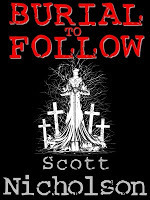 Still, I wasn't going to risk the whole shooting match, and I was shopping a couple of newer manuscripts. But I figured I would put up an old novella, Burial to Follow, and hardly anyone would notice, especially those peers I was so worried about. I did the cover myself, with art taken from the DIRT comic book. Yeah, it's a terribly cheesy cover. I sent it through Amazon for the Kindle, a device I'd read a lot about but had never seen.
Still, I wasn't going to risk the whole shooting match, and I was shopping a couple of newer manuscripts. But I figured I would put up an old novella, Burial to Follow, and hardly anyone would notice, especially those peers I was so worried about. I did the cover myself, with art taken from the DIRT comic book. Yeah, it's a terribly cheesy cover. I sent it through Amazon for the Kindle, a device I'd read a lot about but had never seen.
And I sold two copies as 2009 drew to a close, but I also uploaded The Red Church, my most successful novel. I had held the rights for more than a year, getting a couple of small foreign deals, but I couldn't figure out a way to get it back in print. Of course, by "print" I was thinking of cranking up printing presses and spending thousands of dollars and worrying about bookstore orders.
I sold one copy of The Red Church before midnight. In January, when the price was $1.99 and I was making a 35 percent royalty, I sold 67 copies of Red Church and 12 of Burial to Follow. The next month, I sold 413 copies combined. In March, I sold 771 copies as I added another book. It still wasn't much money, but it began to look reasonable and I softened my stance on self-publishing.
April took me a step back to 667 copies total. March moved up to 793, followed by 1,119 in June, 1,152 in July, and back down to 1,146 in August, when Amazon's 70 percent royalty kicked in and I raised some prices to $2.99.
I haven't done an analysis of how many titles I added during this time, or which book was selling at what price, but I had at least four novels up by then, as well as four or five story collections. Individually, nothing was knocking it out of the park, but collectively it looked like The Little Engine That Could.
During this time I'd been called by a Big Agent who had some interest, though primarily it was for ghostwriting, which would only interest me if it was a pay-off-the-house job. The third time I heard "I can't sell this," I didn't waste another second. I started putting everything up on Kindle as soon as it was edited, proofread, and formatted.
Back to numbers. September made a nice little jump, to 1,949 copies, and my first United Kingdom sales trickled in. October saw the first significant surge, up to 2,799 copies. November got crazy when Disintegration broke into the Kindle Top 100, reaching as high as #30 overall. For the month, I sold 12,422 Kindle e-books.
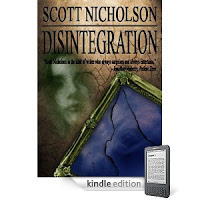 I'll be down for December, as Disintegration did its inevitable cooling, and as of last night I had 5,810 sales for the month to date. All these numbers are for Kindle e-books in the U.S. only. My U.K. numbers are still small in comparison but growing steadily. The Red Church sold 4,764 copies in a year, eight years after its original release and about six years after the publisher had left it for dead. I'm happy to see it is not dead, that people still read it and respond to it. That's one of the best things about this new era: nothing has to die. Ideas can fade and bounce back in a natural ebb and flow and readers can find them in their own time.
I'll be down for December, as Disintegration did its inevitable cooling, and as of last night I had 5,810 sales for the month to date. All these numbers are for Kindle e-books in the U.S. only. My U.K. numbers are still small in comparison but growing steadily. The Red Church sold 4,764 copies in a year, eight years after its original release and about six years after the publisher had left it for dead. I'm happy to see it is not dead, that people still read it and respond to it. That's one of the best things about this new era: nothing has to die. Ideas can fade and bounce back in a natural ebb and flow and readers can find them in their own time.
In my first full year in the Scott Nicholson industry, I sold 29,120 copies on the U.S. Kindle. I had some print-on-demand paper sales and additional e-book sales on other devices like Nook, Kobo, Sony, and iPad, but Amazon is my main outlet. After Jan. 1, many authors will be blogging about their numbers and their success. I'm not competing at a J.A. Konrath level (thanks for the inspiration, Joe) or an Amanda Hocking level, and I'm not laying out these numbers to brag or send anyone scurrying to measure themselves against me. But I have a pretty nice level that works for me and is easy to sustain and build, and that's all any writer should seek.
I don't even know how much money I made, and I wouldn't talk about that anyway, but I do mix my prices between 99 cents and $3.99. Suffice to say that's more copies than I sold in any of my last four mass-market releases, and I made more money in 2010 than in any year in which I was writing for New York. It's easy to get caught up in real-time numbers and rankings and feel like it's all slippery when you move down a few thousand slots in the rankings. But this is the first time I've stepped back and looked at the big picture, and it's pretty stunning.
If I were running a real business, like selling widgets, it's the kind of growth I could take to a bank. It trends pretty solid and steady, with plenty of potential for growth, considering Amazon is claiming 8 million Kindle sales this year. Sure, I have lots of books out now, maybe around 20, and that's swelling my numbers, but my response to that is: Why in the world do I care how many books it takes? I have them and people like them. I'd be stupid to release one a year like major authors do. I want readers to find all my books at any time. And I will write more. That's what I do.
But I also know I didn't do much besides what I love, and I would have written the books anyway. More than 30,000 of you took a bigger risk than I did. You said, "This Scott Nicholson guy is worth a little of my time and money." And I don't take that lightly at all. Thank you.
###
 Still, I wasn't going to risk the whole shooting match, and I was shopping a couple of newer manuscripts. But I figured I would put up an old novella, Burial to Follow, and hardly anyone would notice, especially those peers I was so worried about. I did the cover myself, with art taken from the DIRT comic book. Yeah, it's a terribly cheesy cover. I sent it through Amazon for the Kindle, a device I'd read a lot about but had never seen.
Still, I wasn't going to risk the whole shooting match, and I was shopping a couple of newer manuscripts. But I figured I would put up an old novella, Burial to Follow, and hardly anyone would notice, especially those peers I was so worried about. I did the cover myself, with art taken from the DIRT comic book. Yeah, it's a terribly cheesy cover. I sent it through Amazon for the Kindle, a device I'd read a lot about but had never seen.And I sold two copies as 2009 drew to a close, but I also uploaded The Red Church, my most successful novel. I had held the rights for more than a year, getting a couple of small foreign deals, but I couldn't figure out a way to get it back in print. Of course, by "print" I was thinking of cranking up printing presses and spending thousands of dollars and worrying about bookstore orders.
I sold one copy of The Red Church before midnight. In January, when the price was $1.99 and I was making a 35 percent royalty, I sold 67 copies of Red Church and 12 of Burial to Follow. The next month, I sold 413 copies combined. In March, I sold 771 copies as I added another book. It still wasn't much money, but it began to look reasonable and I softened my stance on self-publishing.
April took me a step back to 667 copies total. March moved up to 793, followed by 1,119 in June, 1,152 in July, and back down to 1,146 in August, when Amazon's 70 percent royalty kicked in and I raised some prices to $2.99.
I haven't done an analysis of how many titles I added during this time, or which book was selling at what price, but I had at least four novels up by then, as well as four or five story collections. Individually, nothing was knocking it out of the park, but collectively it looked like The Little Engine That Could.
During this time I'd been called by a Big Agent who had some interest, though primarily it was for ghostwriting, which would only interest me if it was a pay-off-the-house job. The third time I heard "I can't sell this," I didn't waste another second. I started putting everything up on Kindle as soon as it was edited, proofread, and formatted.
Back to numbers. September made a nice little jump, to 1,949 copies, and my first United Kingdom sales trickled in. October saw the first significant surge, up to 2,799 copies. November got crazy when Disintegration broke into the Kindle Top 100, reaching as high as #30 overall. For the month, I sold 12,422 Kindle e-books.
 I'll be down for December, as Disintegration did its inevitable cooling, and as of last night I had 5,810 sales for the month to date. All these numbers are for Kindle e-books in the U.S. only. My U.K. numbers are still small in comparison but growing steadily. The Red Church sold 4,764 copies in a year, eight years after its original release and about six years after the publisher had left it for dead. I'm happy to see it is not dead, that people still read it and respond to it. That's one of the best things about this new era: nothing has to die. Ideas can fade and bounce back in a natural ebb and flow and readers can find them in their own time.
I'll be down for December, as Disintegration did its inevitable cooling, and as of last night I had 5,810 sales for the month to date. All these numbers are for Kindle e-books in the U.S. only. My U.K. numbers are still small in comparison but growing steadily. The Red Church sold 4,764 copies in a year, eight years after its original release and about six years after the publisher had left it for dead. I'm happy to see it is not dead, that people still read it and respond to it. That's one of the best things about this new era: nothing has to die. Ideas can fade and bounce back in a natural ebb and flow and readers can find them in their own time.In my first full year in the Scott Nicholson industry, I sold 29,120 copies on the U.S. Kindle. I had some print-on-demand paper sales and additional e-book sales on other devices like Nook, Kobo, Sony, and iPad, but Amazon is my main outlet. After Jan. 1, many authors will be blogging about their numbers and their success. I'm not competing at a J.A. Konrath level (thanks for the inspiration, Joe) or an Amanda Hocking level, and I'm not laying out these numbers to brag or send anyone scurrying to measure themselves against me. But I have a pretty nice level that works for me and is easy to sustain and build, and that's all any writer should seek.
I don't even know how much money I made, and I wouldn't talk about that anyway, but I do mix my prices between 99 cents and $3.99. Suffice to say that's more copies than I sold in any of my last four mass-market releases, and I made more money in 2010 than in any year in which I was writing for New York. It's easy to get caught up in real-time numbers and rankings and feel like it's all slippery when you move down a few thousand slots in the rankings. But this is the first time I've stepped back and looked at the big picture, and it's pretty stunning.
If I were running a real business, like selling widgets, it's the kind of growth I could take to a bank. It trends pretty solid and steady, with plenty of potential for growth, considering Amazon is claiming 8 million Kindle sales this year. Sure, I have lots of books out now, maybe around 20, and that's swelling my numbers, but my response to that is: Why in the world do I care how many books it takes? I have them and people like them. I'd be stupid to release one a year like major authors do. I want readers to find all my books at any time. And I will write more. That's what I do.
But I also know I didn't do much besides what I love, and I would have written the books anyway. More than 30,000 of you took a bigger risk than I did. You said, "This Scott Nicholson guy is worth a little of my time and money." And I don't take that lightly at all. Thank you.
###
Published on December 21, 2010 21:42
Transparent Lovers in print
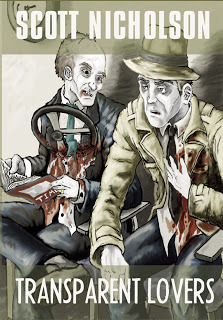 I've been so busy on my e-books I've not properly plugged my limited edition hardcover Transparent Lovers from PS Publishing in the UK. The 100-copy limited signed run is 245 pounds, the regular is 12 pounds (I don't know what that equals in US dollars but you can go to the product page to find out.
I've been so busy on my e-books I've not properly plugged my limited edition hardcover Transparent Lovers from PS Publishing in the UK. The 100-copy limited signed run is 245 pounds, the regular is 12 pounds (I don't know what that equals in US dollars but you can go to the product page to find out.TRANSPARENT LOVERS:
Private investigator Richard Steele is as surprised as anyone when he turns up dead, and then he is given the most challenging case of his career: he must solve his own murder in order for his soul to ascend.
Sounds simple enough, even for a ghost. All he has to do is retrace his steps and get his revenge before his limited supply of karma is depleted. But he can't resist one last visit with his sweetheart, Lee.
And Richard has other problems besides the goons that put a bullet in him. Like his ex-wife, driven to suicide by his mistreatment and now relishing her own opportunity for payback from beyond the grave.
As Richard finds himself once again in an ever-tightening ring of deceit and lies, he must battle enemies on Earth and in heaven, as well as a little bit of hell. And the eternal love everyone dreams about might turn out to be a nightmare.
--------------
For device owners, we're working on an e-book release, hopefully for January. And, yes, the title is an homage to musician Robyn Hitchcock.
Published on December 21, 2010 10:43
December 18, 2010
JT Cummins, rest in peace
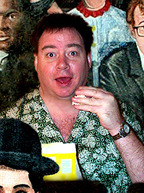 I just learned my friend JT Cummins died in his sleep at 51. A cool, inventive writer, we had shared a lot of ideas about e-books in the past year and did some promotion together. He was one of the few doing movie scripts in e-books and he was very excited about the possibilities of the new digital era. I had just emailed him a few days ago to ask about his scripts, not realizing he had already moved on.
I just learned my friend JT Cummins died in his sleep at 51. A cool, inventive writer, we had shared a lot of ideas about e-books in the past year and did some promotion together. He was one of the few doing movie scripts in e-books and he was very excited about the possibilities of the new digital era. I had just emailed him a few days ago to ask about his scripts, not realizing he had already moved on.A screenwriter and fiction writer, he also worked in special effects in a number of movies like The Thing and House. Hopefully he is sitting in that great movie theater in the sky, watching a double bill with the keyboard by his side.
Published on December 18, 2010 11:50

